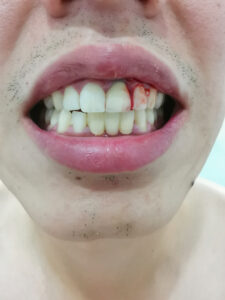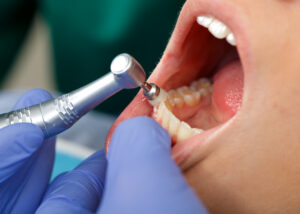Don’t Ignore Bleeding Gums: A Warning Sign You Shouldn’t Overlook

We are still here and had a day of bleeding gums.
Bleeding gums may seem like a minor issue, but they can be a red flag indicating potential problems with your oral health. While it’s common to see a bit of blood when brushing or flossing, persistent or recurring bleeding should not be taken lightly.
I often compare this to what you would do if you woke up and your fingernails constantly bled. – Go to a doctor – so with gums, go and see a dentist or healthcare professional.
So, here are some quick pointers.
Here’s why you should be concerned if your gums bleed:

- Early Sign of Gum Disease: Bleeding gums are often an early indicator of gum disease, also known as gingivitis. Gingivitis is caused by plaque buildup, a sticky film of bacteria that forms on teeth. If left untreated, gingivitis can progress to a more severe form of gum disease called periodontitis, leading to tooth loss.
- Poor Oral Hygiene: Inadequate oral hygiene is a leading cause of bleeding gums. When you neglect proper brushing, flossing, and regular dental check-ups, plaque and bacteria accumulate along the gum line, causing inflammation and bleeding.
- Gingival Trauma: Brushing too hard, using a stiff-bristled toothbrush, or flossing aggressively can cause your gums to bleed. Using a soft-bristled toothbrush and practising gentle brushing and flossing techniques is essential to avoid irritating your gums. But don’t confuse this with not brushing effectively, and PLEASE don’t keep using CORSODYL – it’s just like putting a PLASTER on a problem that really needs to be fixed
- Hormonal Changes: Hormonal fluctuations, especially during puberty, pregnancy, and menopause, can make your gums more susceptible to inflammation and bleeding. Maintaining good oral hygiene during these periods is essential, and consult your dentist if bleeding persists.
- Certain Medications: Some medications, such as blood thinners, can increase the likelihood of bleeding from the gums.
- Underlying Health Issues: Bleeding gums can sometimes indicate systemic health problems like diabetes or immune disorders.
- Preventative Care is Key: Regular dental check-ups and cleanings can help catch and treat oral health issues early on. We provide guidance on proper oral hygiene techniques and recommend suitable products to maintain healthy gums.
- Underlying Health Issues: Bleeding gums can sometimes indicate systemic health problems like diabetes or immune disorders. Your oral health is interconnected with your overall well-being, so addressing unusual symptoms is crucial.
- Preventative Care is Key: Regular dental check-ups and cleanings can help catch and treat oral health issues early on. We love dental hygienists.

Remember, your oral health is a crucial aspect of your overall well-being. Ignoring bleeding gums can lead to more severe oral health issues, so addressing the problem promptly and seeking professional help is essential. Don’t wait until the situation worsens—was our advice today.
Back to blog